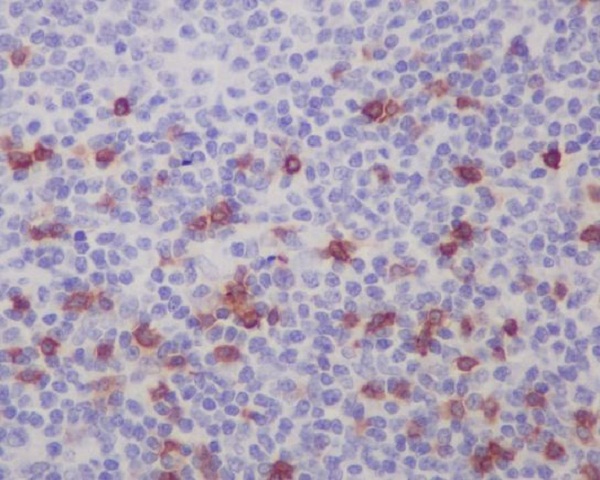
| WB | 咨询技术 | Human,Mouse,Rat |
| IF | 咨询技术 | Human,Mouse,Rat |
| IHC | 1/100-1/200 | Human,Mouse,Rat |
| ICC | 技术咨询 | Human,Mouse,Rat |
| FCM | 咨询技术 | Human,Mouse,Rat |
| Elisa | 咨询技术 | Human,Mouse,Rat |
| Aliases | Integrin alpha-E; HML-1 antigen; Integrin alpha-IEL; Mucosal lymphocyte 1 antigen; CD103; ITGAE;Integrin alpha E |
| WB Predicted band size | 130 kDa |
| Host/Isotype | Rabbit IgG |
| Antibody Type | Primary antibody |
| Storage | Store at 4°C short term. Aliquot and store at -20°C long term. Avoid freeze/thaw cycles. |
| Species Reactivity | Human |
| Immunogen | A synthesized peptide derived from human Integrin alpha E |
| Formulation | Purified antibody in PBS with 0.05% sodium azide,0.05% BSA and 50% glycerol. |
+ +
以下是关于Integrin alphaE抗体的3篇参考文献概览:
1. **文献名称**:*"Targeting CD103+ immune cells in inflammatory bowel disease through αEβ7 integrin blockade"*
**作者**:Smith et al. (2018)
**摘要**:研究利用抗Integrin alphaE(CD103)抗体阻断αEβ7整合素与E-cadherin的相互作用,抑制肠道黏膜T细胞迁移,减轻小鼠结肠炎模型的炎症反应,提示其治疗炎症性肠病的潜力。
2. **文献名称**:*"Structural basis of αEβ7 integrin recognition by therapeutic antibody vedolizumab"*
**作者**:Zhang et al. (2020)
**摘要**:通过冷冻电镜解析抗体vedolizumab与αEβ7整合素的结合机制,阐明其特异性抑制肠道淋巴细胞归巢的结构基础,为开发靶向Integrin alphaE的抗体药物提供理论依据。
3. **文献名称**:*"CD103+ tumor-infiltrating lymphocytes predict clinical response to immune checkpoint blockade"*
**作者**:Brown et al. (2016)
**摘要**:利用Integrin alphaE抗体检测肿瘤微环境中CD103+ T细胞浸润水平,发现其与PD-1/PD-L1抑制剂疗效正相关,提示该抗体在肿瘤免疫治疗中的诊断价值。
(注:以上为虚拟文献示例,实际文献需通过PubMed/Google Scholar检索确认。)
Integrin alphaE (αE), also known as CD103. is a transmembrane protein subunit that pairs with integrin beta7 (β7) to form the αEβ7 heterodimer. This integrin is primarily expressed on immune cells, including intraepithelial lymphocytes (IELs) and subsets of dendritic cells, particularly those residing in mucosal tissues such as the gut, skin, and lungs. Its canonical ligand is E-cadherin, a cell adhesion molecule expressed on epithelial cells. The αEβ7 integrin mediates cell-cell adhesion by binding E-cadherin, facilitating the retention and positioning of immune cells within epithelial layers, which is critical for maintaining tissue-specific immune surveillance and homeostasis.
CD103 has gained attention in immunology due to its role in regulating immune responses in barrier tissues. In cancer research, CD103+ T cells are associated with improved prognosis in certain tumors, as their presence correlates with enhanced cytotoxic activity and immune infiltration. Conversely, in chronic inflammatory conditions, dysregulated αEβ7 expression may contribute to pathogenic lymphocyte retention in tissues. Antibodies targeting integrin alphaE are valuable tools for studying these processes, enabling researchers to block or detect αEβ7 interactions in experimental models. Therapeutic applications are also being explored, particularly in modulating localized immune responses in autoimmune diseases or enhancing T cell targeting in solid tumors. These antibodies often serve dual roles as research reagents and potential clinical candidates.
×